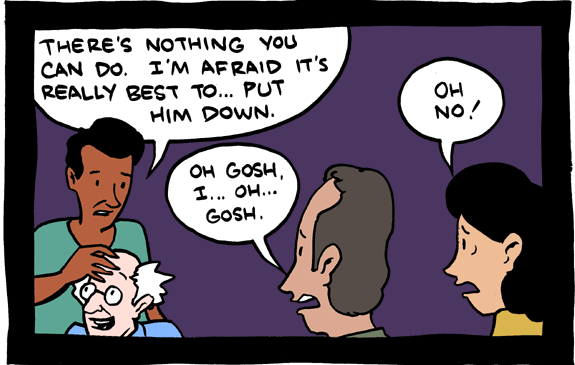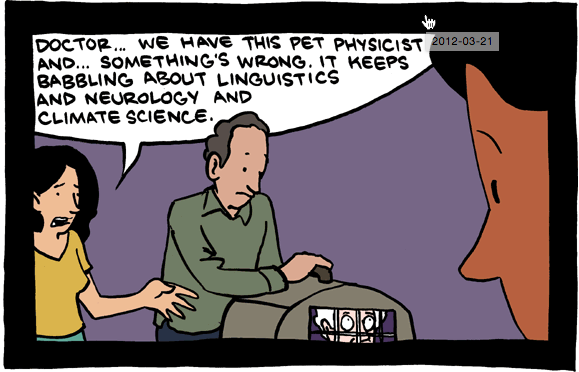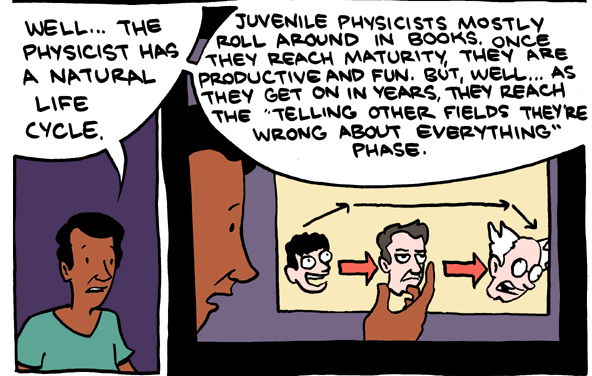The life cycle of physicists
« previous post | next post »
From the most recent SMBC — the symptoms:
The diagnosis:

Read the whole thing…
March 21, 2012 @ 9:57 am · Filed by Mark Liberman under Linguistics in the comics
« previous post | next post »
From the most recent SMBC — the symptoms:
The diagnosis:

Read the whole thing…
March 21, 2012 @ 9:57 am · Filed by Mark Liberman under Linguistics in the comics
Powered By WordPress


Cy said,
March 21, 2012 @ 11:16 am
Physics is a weird field. The public gives them a lot of slack – just enough to really hang themselves, but because science is so uncritically accepted, we become stuck with all this crackpot science, from individuals who should really know better. Murray Gell-Mann comes to mind. Feynman, who had that great speech about cargo cult science, wrote about his theories in passing completely uncritically. I'd like to think that means linguistics is cognitively more demanding and tricky than physics, but it's probably just the human tendency to assume that mastery of usage implies mastery of theory.
MattF said,
March 21, 2012 @ 11:35 am
Physics really does have a distinct cognitive style– the 'spherical cow' is a joke, but only just. On the other hand, an ellipsoidal cow…
Ross Presser said,
March 21, 2012 @ 11:43 am
From the forum thread on this SMBC comic:
Reading is hard and less panels usually = less words.
Oy gevalt. "Reading is hard"???
leoboiko said,
March 21, 2012 @ 11:47 am
@Ross: Let’s go mathing! Wait…
KeithB said,
March 21, 2012 @ 12:19 pm
CY:
I certainly hope you are not talking about Quantum Chromo-Dynamics!
Coby Lubliner said,
March 21, 2012 @ 12:27 pm
This supposed joke doesn't describe any of the many physicists I have known; it's just that physicists have the habit of solving problems by going back to first principles. Now, economists are another matter.
Cecilieaux Bois de Murier said,
March 21, 2012 @ 12:46 pm
Clearly, the rambling on linguistics was the physicists undoing!
Martin J Ball said,
March 21, 2012 @ 1:18 pm
Sheldon Cooper does make some very prescriptivist linguistic remarks…
Rube said,
March 21, 2012 @ 1:20 pm
@Martin J Ball — Would you say that Sheldon's in his "juvenile" or "productive and fun" phase?
Sili said,
March 21, 2012 @ 1:25 pm
Coby,
That's the problem. xkcd has done work on the arrogance of physicists as well. 'They' have a tendency to think that they can ignore everything ever done outside their field and solve every problem on the back of an envelope. And as a result we get techno-utopians like Freeman Dyson and denialists like Luboš Motl muddling the waters on good science in the public's mind.
To be fair, surgeons and doctors tend to play at the game, too, thinking that their training makes them scientists. And hence we get the likes of Egnor: a mind-body dualist brain surgeon.
Sili said,
March 21, 2012 @ 1:27 pm
Rube,
Look at the diagram. Some people skip the middle stage and go straight to Time Cube territory (*cough* undergraduate philosophers *cough*cough*).
Xmun said,
March 21, 2012 @ 2:09 pm
Never mind the physicist. The satire on vets is exactly right.
Rubrick said,
March 21, 2012 @ 4:37 pm
Thank goodness there are no linguists who fancy themselves qualified to expound on, say, politics.
Wonks Anonymous said,
March 21, 2012 @ 5:06 pm
Like KeithB, I was also surprised by Cy's Gell-Mann reference. Is he referring to his work with the Santa Fe institute? I was unaware he had done crackpot stuff.
Jonathan Badger said,
March 21, 2012 @ 5:11 pm
I think the issue is that traditionally, physicists knew a lot of math and how to analyze things quantitatively at a time when most other fields were qualitative. Then the physicists really *did* help other fields — biology was put onto a much more mathematical framework after World War II, in part because there were a lot of physicists who had gotten fed up with weapons and became biologists.
The problem is that today many physicists don't understand that the rest of us study math these days and that computational biologists exist. It wouldn't surprise me that they don't know about computational linguists either.
Mark F. said,
March 21, 2012 @ 6:57 pm
The Wikipedia article on Gell-Mann begins
and later it says
So now I know who Zach Weiner had in mind with "We can recreate the first language using statistics" (later in the strip).
Alex said,
March 21, 2012 @ 8:04 pm
This wouldn't be so much of a problem if other fields didn't suffer periodic paroxysms of physics envy. Not every field is suited to exclusively deductive, quantified methods. I'm not even sure physics is, but outsiders seem to see it as the archetypical hard science.
I'm in archaeology. It's a historical social science– very few relevent experiments can be conducted. And yet we've gone through phases where people feel the need to bash inductive and qualitative methods, in the hopes that being more like physics will get us more respect or funding or masculinity or something. Mostly what it leads to are really trivial research results (e.g. artifacts tend to migrate downhill) because half of your analytical tools have been discarded a priori.
Carl said,
March 21, 2012 @ 10:38 pm
Speaking for all philosophers ever, I love it when physicists tell us that we've never done anything, and they've managed to solve all our problems over a lunch break.
maidhc said,
March 21, 2012 @ 10:39 pm
I remember a physicist whose approach to debugging a malfunctioning computer was to start with the assumption that the problem was caused by ions created by the cooling fan affecting the voltage levels of the system, and to develop increasingly elaborate schemes to remove the guilty ions.
Carl said,
March 21, 2012 @ 10:41 pm
@Alex
Philsophers are the worst about this. "Hey, who cares about Plato, let's use some mathematical notation in our papers. That'll solve all our problems!"
Dakota said,
March 22, 2012 @ 6:58 am
Totally OT, except that it is also from a comic; in the last panel Dilbert says, "I should take a picture in case someone ever asks me if ignorance has a tell." After getting over the cognitive dissonance I realized I understood it.
http://dilbert.com/strips/comic/2012-03-22/?utm_source=feedburner&utm_medium=feed&utm_campaign=Feed%3A+dilbert%2Fdaily_strip+%28Dilbert+Daily+Strip+-+UU%29&utm_content=Google+Reader#
marie-lucie said,
March 22, 2012 @ 8:34 am
Gell-Mann also is … a gifted linguist. He notably assisted S.A. Starostin in his reconstruction of the Proto-Human language.
I am speechless.
Sybil said,
March 22, 2012 @ 8:49 am
@marie-lucie: …
@leoboiko: I've recently been told that converting a mixed number to an improper fraction is something that only Math majors (in a well-respected college) should be expected to be able to do. We've gone way beyond "Math is hard". So I giggled and cried at your comment.
Acilius said,
March 22, 2012 @ 4:11 pm
A hundred years ago or so, classical scholars often exhibited a similar progression. There was also a stage in between maturity and "telling other fields they're wrong about everything," in which they would find fault with people writing about work in other fields for not including material about the ancient Greeks and Romans. They would always offer rationales for these complaints, but in reality they were, of course, simply demanding tribute from those who ranked below them in academic prestige.
Nowadays the classicists have fallen low in the academic hierarchy, and theoretical physics is among the subjects at or near the very top. But I would caution physicists, and people in other fields who currently behave in the ways that classicists used to do, that all things change. Much of the reason why classicists today find it so difficult to find a fair hearing when they lay out the case for their subject is that a bad taste still lingers from the arrogance of their predecessors. If today's physicists would spare their successors in the next century the frustrations that classical scholars face today, they would be well-advised to learn humility.
Keith M Ellis said,
March 22, 2012 @ 7:44 pm
Having some sense of the limits of competency outside one's particular field of expertise is well-advised for everyone. But this is especially true for any working scientist or academic. And while all people are prone to this problem, what's particularly troublesome with credentialed experts, especially academics and researchers, is that their credentials tend to carry weight with unsophisticated audiences when speaking (apparently) authoritatively outside their competency.
Mark and others here do a lot of work debunking such nonsense when it concerns linguistics, yet Mark is not averse to speaking (apparently) authoritatively about science outside his expertise. That's not always and necessarily a bad thing when it's being skeptical about popularly reported scientific results where all of us, with any critical faculty and some training, should be similarly skeptical. Nevertheless, there still is the competency problem involving credentialed experts writing/speaking outside their expertise because both audiences and themselves tend to lose sight of the fact that, in these cases, they're not actually experts or speaking authoritatively. When someone like myself comments in a blog, I might be confused about this with regard to myself, but there's little chance that any readers would be also confused.
Because, of course, it's not just that people like Gell-Mann decide they they can do linguistics. They also tend to be…critical…of results in other fields when the results seem to them to be wrongheaded. Thus the climate science nonsense where physicists and others are being exactly as skeptical outside their expertise as Mark and others here sometimes are. Yet, again, we should all be skeptical. But we should all be aware of the limits of our expertise, especially when we're discounting the opinions of those who actually have credentials and experience in the particular matter at hand.
In any case, there's no doubt that physicists and engineers suffer the most from this malady of arrogance. But there's a correlation to a propensity for this with the supposed hierarchy of sciences in terms of "soft" to "hard". Thus we have things like the person in that other thread telling us that linguistics is more a pseudoscience than a science. Anyone working in the so-called hard sciences tends to think that all the social sciences aren't really science. And because they tend to think this, they tend to feel that any competency they might imagine they have is probably equal to that of any social scientist, given their presumption that social scientists aren't really scientists, anyway.
I've always found this very odd because my own experience has been that the more I've developed expertise in something, and especially so academically and with regard to science, the more there was a sense that competency and expertise is very, very narrow. My own experience is that people in different subfields in the same discipline don't even expect their colleagues (in those other subfields) to have any competency to be able to intelligently discuss certain topics, much less offer anything of value. That's excessive, of course, but I don't understand how this awareness of narrow competency is turned on its head with many scientists and academics. It's just weird and personally distressing to me.
Jerry Friedman said,
March 22, 2012 @ 11:44 pm
I don't see the problem. When we physicists help people in other fields, we're usually quite diplomatic about our superior problem-solving abilities.
JUST KIDDING.
J. Goard said,
March 23, 2012 @ 12:53 am
Hmm, I wonder if we can come up with, say, a syntactician who has regularly made grand claims about child language acquisition, typology, animal communication, primate evolutionary history or evolutionary theory without demonstrating expertise in such areas of research…
Alan said,
March 23, 2012 @ 2:23 am
A quick scan of the list of Nobel prize winners in physics reveals these discoveries:
– Optical fibres, used in high speed data links, probably including the data on this web page
– Digital cameras
– Integrated circuits, found in almost every electronic device you use
– Liquid crystals, used in digital displays
– Transistors, the building blocks of integrated circuits
– General relativity, without which your GPS would be in error by a few miles per day
– Xrays
– Radio
No wonder physicists tend to get a bit cocky about the power of physics.
The older members of almost every profession are prone to emeritus disease.
Carl said,
March 23, 2012 @ 11:28 pm
@J. Goard,
Worse, what if some linguist kept going on and on about his theory of international relations and American history? He'd make the whole profession look silly.
Keith M Ellis said,
March 23, 2012 @ 11:40 pm
"A quick scan of the list of Nobel prize winners in physics reveals these discoveries"
Wow, physics is useful for technology! That's such an irrefutable argument in favor of physicists theorizing about linguistics!
Clearly, all scientific disciplines should be judged according to their technological utility. We'd probably have to get rid of some physics sub-disciplines, too, such as cosmology and string theory, say, but that only makes sense.
We should make all university funding decisions on this basis.
Oh, wait, we already are. Cool!
Dave said,
March 24, 2012 @ 4:58 am
Academia: the circular firing-squad in which everyone just knows that pulling the trigger is the right thing to do.
David J. Littleboy said,
March 25, 2012 @ 5:11 am
"Son, you can study whatever you want at college. But just remember: if you aren't a good physicist, you aren't a good human being."
A really famous MIT physicist visiting our home, spring or summer 1972, on learning that I was planning on majoring in computer science. Physicists really are something else.
"Wow, physics is useful for technology!" Well, no it's not. Without Alan Turing, Claude Shannon, and the rest of us, all that physics would be nothing more than laboratory curiosities.
Jerry Friedman said,
March 25, 2012 @ 4:56 pm
@David J. Littleboy: I've known lots of physicists, and I've never heard anything like that. Maybe some of us are something else, and some of us are something other than that.
I was trying to think of what really famous physicists were at MIT in 1972, and I realized that one was Jerry Friedman. I'm not him.
By the way, my favorite example of this sort of interdisciplinary rivalry is from MIT, as a friend of mine told me. He had mentioned to a math major that he was majoring in physics. The math major said, "Don't you find that too easy?"
Frank GIbbons said,
March 26, 2012 @ 2:36 pm
As a former physicist (who almost majored in linguistics!), I find the cartoon amusing. 'Emeritus disease' as someone here called it, is common to many disciplines, and perhaps more to physics than most. But what a physics degree does give to its holder is the confidence, not that they know it all, but that they can learn most things. I've written engineering software in Silicon Valley, transitioned to Computational Biology (so I do know that it exists!), and now work at a large pharma company doing Quantitative Systems Pharmacology Modeling. It wasn't easy to make those transitions, and I do still sometimes feel the lack of experience in these domains, but they are all domains in which a facility in quantitative analysis can take one a long way. I think as long as one recognizes that one needs to fill those shortcomings by working as part of a team, made up of individuals of diverse experience, physics can take you a long way. I usually end up here after prompting from languagehat, always enjoy it! Now, forgive me, I need to forward that cartoon to my physicist friends, see if any of them recognize themselves! ;-)
Alejandro Rivero said,
March 27, 2012 @ 5:23 pm
ahem… So, Linear B?
Matt said,
March 31, 2012 @ 12:38 pm
Y'know I think this is less a "physicists asserting things which are wrong" (although c.f. Michio Kaku on recent human evolution for a sterling example) so much as "Physicists making mathematically backed hypotheses, for fun, which less mathematically able experts in a field are entirely unable to assess and refute at all".
(I mean, "Let's see if we can do psychohistory!" is the kind of thing a physicist might do for fun, but which others in overlapping fields who can't quite use maths near as well might find upsetting, if they can't really understand what they're doing at all, and will take SUPER SERIOUS!).
And to be fair, their field is "The entirity of reality". They've just got some bits mapped out better than others. =)
"The problem is that today many physicists don't understand that the rest of us study math these days and that computational biologists exist."
The math ability thresholds for physics vs other fields are still quite different though, even including the computational and physics linked subfields.